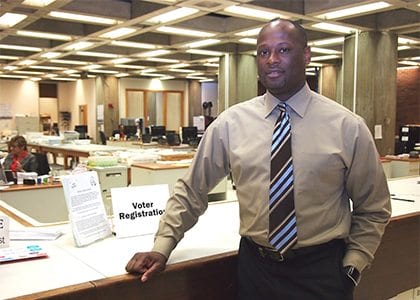
The fiasco of the Sept. 8, 2015 preliminary election was set in stone months before Dion Irish was named the city’s election commissioner. Just 7 percent of registered voters turned out for the preliminary, held on a sweltering, star-crossed Tuesday, earlier than typical fall elections and coinciding with both the first day of school and the day after the long Labor Day weekend.
Irish understands that dealing with the aftermath of the preliminary is now his responsibility.
“When you’re in government, particularly in the department head role, you’re in the hot seat,” he said. “We have to do everything we can to make sure nothing goes wrong.”
In hindsight, Irish says the Election Department may revisit its policy of allowing the Boston City Council to determine the date of elections when there’s a conflict with the normal schedule. (This year, the Jewish holiday of Yom Kippur falls on the third Tuesday of September, the day the preliminary would normally be held).
But ultimately, Irish says, much of the blame for low turnout falls on voter apathy.
“We have a right to vote, but we should also look at is as a duty,” he said. “It’s bigger than the candidates. It’s about how we govern. We’re in a participatory democracy. Voting makes democracy stronger.”
Irish, who grew up in Roxbury, got his start in city government working with the Inspectional Services Department, before moving on to head the city’s Office of Fair Housing and Equity. At the Election Commission, he succeeds interim Commissioner John Donovan, who retired.
The disappointing turnout of Sept. 8 underscores the challenges Irish faces. The city has seen a long, steady decline in turnout for municipal elections. Just 31 percent of registered voters cast ballots in the 2013 municipal preliminary, despite a field of 12 candidates for mayor and 20 candidates for at-large City Council seats. In the November election that year, just 38 percent of registered voters cast ballots.
Moving forward, Irish points to two developments that may help boost turnout and make voting easier.
In next year’s state election, when voters elect their state representatives and senators, Boston and the other 350 cities and towns in Massachusetts will implement early voting, allowing voters to cast ballots starting 11 days before Election Day. While Boston hasn’t ironed out the details – mainly, whether locations other than City Hall will be open for balloting – Irish says the reform will make it easier to vote.
“We’re very excited about this,” he said. “It will make voting more accessible by not limiting it to one day.”
MassVOTE Executive Director Cheryl Clyburn Crawford, who headed efforts to institute early voting and other reforms, says the details of how the voting program is implemented are important.
“So far, there are no provisions for early hours or weekend hours,” she said. “In Boston, we should be looking at locations where people can vote after work, like libraries or community centers.”
The second reform, which is less certain, is the re-drawing of the city’s precinct lines. All Massachusetts cities and towns are required to re-draw the lines of voting precincts every ten years, as data from the decennial U.S. Census is made available. All precincts in a municipality are intended to have roughly the same number of voters.
Legislators exempted Boston from the state law mandating the re-drawing of precincts, and has not done so in more than 100 years. During that expanse of time, the city’s population swelled to more than 800,000 and then plummeted to 562,000 in 1980. Now, with luxury high-rises going up in areas that until recently had few residential units, the relative population of precincts has become uneven. In Ward 3, which includes much of Downtown Boston, there are two precincts with more than 4,000 eligible voters, while in Ward 12, centered in Roxbury, there are four precincts with fewer than 1,000 voters.
Irish says the city has a vested interest in re-drawing precincts and equalizing the population in each, as equalizing the population could reduce the number of precincts from 255 to 190.
With a minimum of six poll workers required to cover each precinct, the reduction could cut the city’s Election Day costs substantially, eliminating the need for 390 of the more than 1,700 temporary workers the city hires and trains for each election.
At-large City Councilor Ayanna Pressley has filed a resolution supporting a House bill filed by state Rep. Aaron Michlewitz which would require Boston to redraw precinct lines following the 2020 Census.
“At its core, it’s about equitable access and making it easier for folks to engage,” Pressley said of her resolution. “Ultimately, it’s about one-person, one-vote.”
As Pressley points out, with the current range of precinct sizes — from 473 in Ward 8, Precinct 7 to 4,550 in Ward 5, Precinct 1 — it’s virtually impossible to draw legislative and city council districts that are equal in size.
The missing voters
One other hiccup Irish had to resolve early on was the accidental exclusion of 200 voters from City Council District 4, an accident discovered by a voter. Fortunately, the voters were re-assigned to vote in District 4 in time for the election — but the gaffe triggered a city-wide review of voting locations, Irish said. The review identified one other problem, affecting four voters, which was also rectified.
“We can confidently say that every address is properly precincted for the first time in 70 years,” he said.







